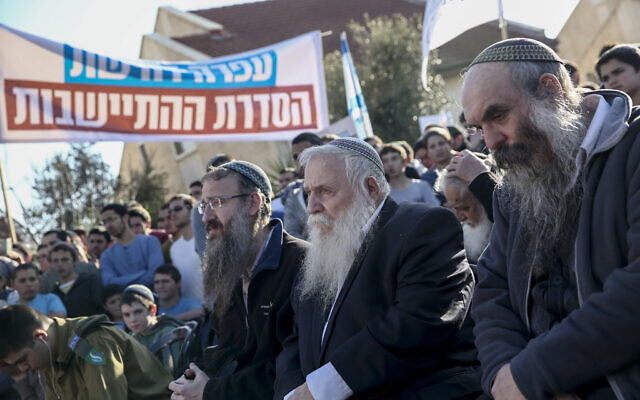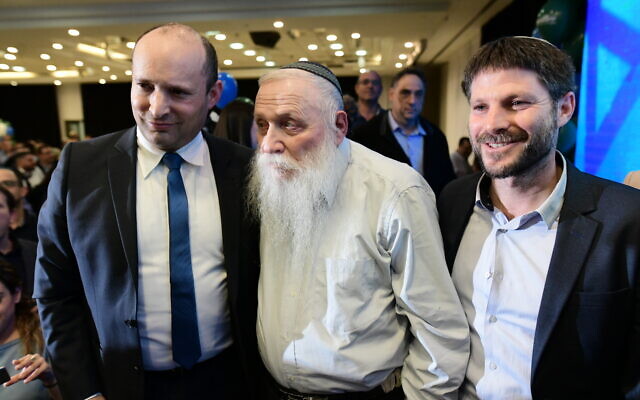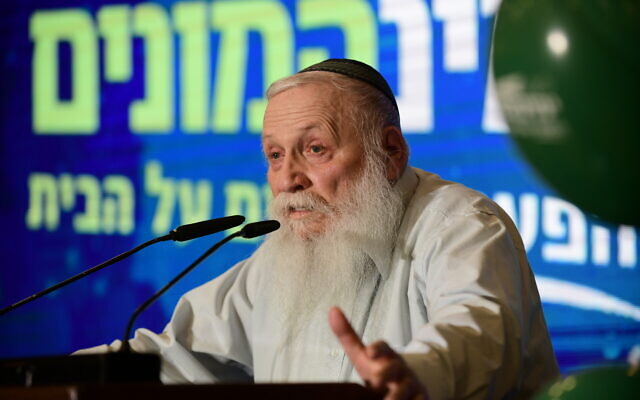Rabbi Chaim Druckman, a leading and controversial figure at the conservative end of the religious Zionist movement, died on Sunday after contracting the coronavirus earlier this month at the age of 90.
His funeral was to be held at 12 p.m. on Monday in the southern community of Masu’ot Itzhak.
Druckman, a protégé of the influential nationalist Rabbi Zvi Yehuda Kook, was credited with coining the name of Gush Emunim — literally, the Believers’ Bloc — for the nascent settler movement, which was founded in his Merkaz Shapira living room in 1974. The movement eventually shifted the predominant element within religious Zionism from the center-left political position it had maintained at the founding of the state to the right, and then to the far right where it stands today.
A winner of the Israel Prize, Druckman was a major power broker in Israeli politics for decades, as a Knesset member, a deputy minister and more recently as the spiritual leader of religious Zionist parties. He also held influential religious posts, serving as dean of the Or Etzion Yeshiva, head of the network of all seminaries affiliated with the religious Zionist Bnei Akiva movement, and president of the union of Hesder yeshivas, seminaries for men who combine military service with religious study.
Over the years, Druckman butted heads with ultra-Orthodox rabbis over his more liberal views on conversion to Judaism, as well as with state authorities for his at-times subversive stances, particularly his calls for religious soldiers to refuse orders to evict West Bank settlements. He also faced criticism for defending prominent sexual offenders.
Druckman contracted the COVID-19 virus earlier this month, for the second time. He initially received treatment from a team of doctors at his home in the community of Mercaz Shapira in central Israel, but was moved to Jerusalem’s Hadassah Hospital Ein Kerem last week after his condition deteriorated.
Doctors resuscitated Druckman last Wednesday afternoon, but he remained in serious condition through the weekend.
“The rabbi was hospitalized in Hadassah Hospital Ein Kerem in very serious condition and was treated diligently by the staff of the intensive care ward for the past 10 days, but they were ultimately forced to pronounce him dead this evening,” the hospital said.
Druckman was quickly eulogized by the country’s leading politicians and public figures.
“The Torah of Israel, the people of Israel, and the land of Israel were his focus hour after hour, day after day, and he dedicated his life for the State of Israel and the Jewish people,” said President Isaac Herzog on Sunday night.
Religious Zionism party leader Bezalel Smotrich referred to Druckman’s death in biblical terms. “We have become orphans, fatherless,” he wrote, citing the Book of Lamentations.
“The people of Israel and the entire world has lost one of the spiritual giants of our generations, a pious man, a teacher, a man whose whole life was dedicated to the Torah of the land of Israel, to the people of Israel and the land of Israel,” Smotrich said.
Former prime minister Naftali Bennett, who was once one of Druckman’s top disciples, recalled his former spiritual leader as a man of moderation “who used all of his strength to mediate and to unify all parts of the Israeli people.”
Incoming prime minister Benjamin Netanyahu specifically recalled Druckman’s efforts in the area of conversion, saying the rabbi “found a way of bringing hearts together that helped masses of new immigrants to join the ranks of our people.”
From Kuty to Palestine
Born in the town of Kuty in what was then-Poland and is now Ukraine in 1932, Druckman survived the Holocaust first by hiding with his parents and then by fleeing Europe in 1944, posing as the son of a couple that had no children of their own in order to immigrate to then-Palestine. Shortly after the war, his parents joined him in the Holy Land.
In Palestine, Druckman studied in a Bnei Akiva-affiliated yeshiva in the community of Kfar Haroeh. In 1949, he enlisted in the nascent Israel Defense Forces in the Nahal program, during which time he also helped establish the religious communities of Kibbutz Tirat Zvi in northern Israel and Kibbutz Saad near the Gaza border.
After his military service, Druckman studied at the Mercaz Harav Yeshiva — the flagship institution of the religious Zionist movement — in Jerusalem under Rabbi Zvi Yehuda Kook, the son of Rabbi Abraham Isaac Kook, Israel’s first Ashkenazi chief rabbi and the progenitor of the religious Zionist theology. A brilliant and devoted student, Druckman emerged as one of Kook’s top disciples.
After a brief stint in the United States in the mid-1950s as a Bnei Akiva emissary, Druckman was sent by Kook to run the Or Etzion Yeshiva in Mercaz Shapira, then a tiny, new community formed on the grounds of an abandoned Palestinian village northeast of Ashkelon. As dean of the Or Etzion Yeshiva, Druckman taught some of Israel’s most influential leaders, including Defense Minister Benny Gantz, former Mossad chief Yossi Cohen, and Likud Knesset member Israel Katz.
On Sunday night, Gantz eulogized his former teacher, recalling his time at the Or Etzion Yeshiva.
“My heart weeps over the death of Rabbi Druckman. I had the honor of being one of his students at the Or Etzion Yeshiva as a youth,” Gantz said. “The rabbi was a believer, dedicated to the State of Israel and the Zionist idea… and I always found that he had an open ear.”
A firm believer in the sanctity of the biblical land of Israel, Druckman was part of a group that held a Passover seder in the city of Hebron in 1968, which led to the eventual establishment of a renewed Jewish settlement in the city. Following the devastating 1973 Yom Kippur War, Druckman and a group of other Kook students formed Gush Emunim, a group dedicated to hardline policies on territorial issues, particularly those dealing with the biblical land of Israel.
“This land is the Land of Israel, and in the Land of Israel Jews [should be allowed] to settle anywhere,” Druckman said in a recent interview in which he also supported the creation of a “halachic state,” one operating according to Jewish law.

Rabbi Chaim Druckman, center-right, attends a demonstration against the demolition of nine homes in the Ofra settlement in the northern West Bank on February 5, 2017. (Noam Revkin Fenton/Flash90/File)
Ahead of the fateful 1977 elections, which would result in Israel’s first Likud-led government, Kook tapped Druckman to run as number two on the ticket of the National Religious Party, more commonly known by its abbreviation Mafdal.
When Menachem Begin’s Likud won again in 1981, Druckman was named deputy religious services minister. He served in that role for just seven months before quitting in protest of the government’s eviction of the Yamit settlement on the Sinai Peninsula as part of the peace agreement with Egypt. During that time, Druckman and his family also temporarily moved to Yamit in order to further fight the expulsion.
“I oppose it. I voted against it. The Yamit area is Eretz Yisrael according to the Bible,” Druckman told a reporter in 1982, using the Hebrew term for the Land of Israel. “Eretz Yisrael you build, you don’t destroy. I am against evacuating any settlement, whatever we get in return.”

Rabbi Haim Druckman (L) Naftali Bennett (C) and Bezalel Smotrich attend the campaign launch of the right-wing Yamina party, ahead of the Israeli general elections, February 12, 2020. (Tomer Neuberg/FLASH90)
In 1983, Druckman broke off from the more centrist Mafdal and helped form a right-wing religious Zionist party, Morasha, which performed poorly in the following election. In 1986, Druckman left Morasha and rejoined Mafdal. Two years later, he dropped out of formal politics but remained a vocal, active figure in the national discourse, particularly during the signing of the Oslo Accords. Druckman appeared on stage during a now-infamous rally against then-prime minister Yitzhak Rabin a month before Rabin’s assassination.
Druckman returned to the Knesset in 1999, serving the full four-year term during the heart of the Second Intifada, before retiring from official political life in 2003.
For years, he served as the spiritual leader of the Jewish Home party under Bennett, before switching to publicly support Smotrich’s far-right Religous Zionism party ahead of the March 2021 elections.
Conversion controversy
Beginning in the mid-1990s, following the wave of immigration from the Soviet Union, Druckman became deeply involved in the issue of conversion to Judaism, serving as the chief rabbinic judge, or Av Beit Din, on a conversion court and leading a government commission that advocated performing more lenient conversions for minors. In 2004, he was appointed head of the State Conversion Authority, a body within the Prime Minister’s Office that oversees conversions in Israel.
His more moderate stances on conversion put Druckman deeply at odds with the far more stringent positions of ultra-Orthodox rabbis. This long-simmering disagreement came to a head in 2007 when a rabbinic judge hearing a divorce case involving a woman who had converted in Druckman’s court ruled that her conversion was invalid and the Druckman and the other judges on the conversion court were “sinners and heretics.” When the woman appealed this to the High Rabbinical Court, the judges not only upheld the lower court’s ruling but expanded it, nullifying all conversions performed by Druckman in the previous nine years and declaring him a disqualified judge.
This dramatic ruling affected thousands of people who converted through Druckman. It officially remained in place for four years until the High Court of Justice overturned the rabbinic court’s ruling.
Though it was ultimately for naught, Druckman was a reluctant but eventual supporter of the outgoing government’s conversion reforms, which in the end failed to pass before the coalition fell apart earlier this year.
A murky history of defending the indefensible
As a staunch believer in and leader of the settlement movement, Druckman often spoke out against the eviction of West Bank outposts by the military, saying that religious soldiers should try to get out of performing such operations and outright refuse if necessary.
Druckman voiced his views ahead of Israel’s 2005 Disengagement, when the government evacuated all settlements in the Gaza Strip and a number of them in the northern West Bank, signing a letter along with a number of other religious Zionist rabbis claiming that Jewish law forbade “a Jew from taking part in or in any way assisting in the dismantling of a settlement or an outpost in the land of Israel.” Druckman made similar remarks in 2010, though he somewhat softened his language, leaving it unclear if he believed soldiers should explicitly refuse an order to evict a settlement.
Unlike some of his more zealous contemporaries, Druckman generally tried to strike a balance between his more religious sensibilities and the realities of living in a democratic country. He opposed a religious ruling that forbade Jews from renting apartments and homes to Arab Israelis but said it was justified to refuse to rent to Arabs in some cases.

Rabbi Chaim Druckman attends the campaign launch of the right-wing Yamina party, ahead of the Israeli general elections, February 12, 2020. (Tomer Neuberg/Flash90)
Druckman often defended Jewish extremists, including those convicted of violent crimes against Palestinians. In 1988, when he was a Knesset member, Druckman sent a letter of support to a member of the Jewish Underground terrorist group upon his release from prison, after serving a four-year sentence for his role in a deadly terror attack on the Islamic College in Hebron in 1983 that left three Palestinian students dead and dozens wounded. In 2012, Druckman arranged a send-off party for a Zvi Strock, the son of now-Religious Zionism MK Orit Strock, who was convicted of torturing a Palestinian teenager five years prior. More recently, in 2019, he led a campaign to raise money to pay the legal fees of a settler youth who was indicted for killing a Palestinian mother of eight.
Druckman also stood by rabbis accused of sexual assault. He was chastised by the state attorney in 1999 for failing to report multiple cases of sexual abuse by the dean of Netiv Meir Yeshiva, Ze’ev Kopolevitch, who was later convicted of performing indecent acts on his students.
Though Druckman in 2012 acknowledged he should have reported the matter to police, he again came to the defense of another rabbi convicted of sexual abuse, the charismatic Moti Elon, in 2013. Even after Elon was found guilty, Druckman brought the disgraced rabbi to speak at his Or Etzion Yeshiva for years, until finally in 2019, after years of criticism, he decided to stop inviting him, saying in a public letter that Elon should no longer appear in public. In recent months, Druckman was dismissive of rape allegations against Rabbi Zvi Tau, calling them “gossip.”
Druckman is survived by his wife of 65 years, Sarah, a doctor, one of the first religious women to graduate from Hebrew University’s medical program.
The two have nine children, including one adopted daughter and a daughter with Down syndrome. They have scores of grandchildren and great-grandchildren.
"politic" - Google News
December 26, 2022 at 03:01AM
https://ift.tt/HT0MsSa
Rabbi Chaim Druckman, spiritual leader of political religious Zionism, dies at 90 - The Times of Israel
"politic" - Google News
https://ift.tt/LX9A2Z6
https://ift.tt/nfO6bsG
/cloudfront-us-east-1.images.arcpublishing.com/bostonglobe/VNG7YMZTRWJ5WBFTJ5NVETPCQI.jpg)
No comments:
Post a Comment